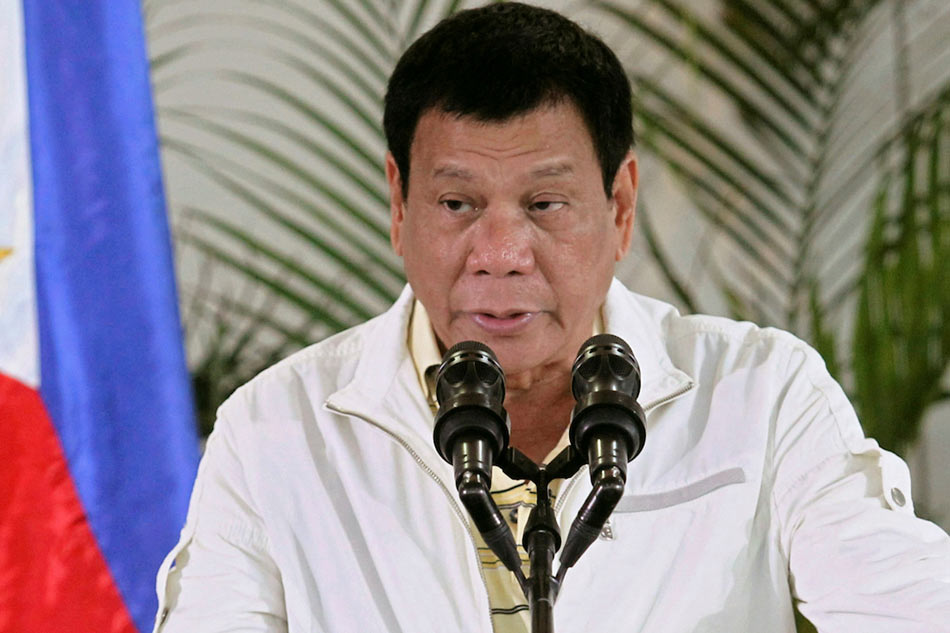Duterte asks: What if there is no God?
ADVERTISEMENT

Welcome, Kapamilya! We use cookies to improve your browsing experience. Continuing to use this site means you agree to our use of cookies. Tell me more!
Duterte asks: What if there is no God?
ABS-CBN News
Published Sep 26, 2016 08:47 PM PHT
|
Updated Sep 26, 2016 09:21 PM PHT
"What if there is no God?"
"What if there is no God?"
This was a question posed by President Rodrigo Duterte during the oath-taking ceremony of Malacañang Press Corps officials on Monday, in relation to his bid to revive capital punishment in the Philippines.
This was a question posed by President Rodrigo Duterte during the oath-taking ceremony of Malacañang Press Corps officials on Monday, in relation to his bid to revive capital punishment in the Philippines.
Duterte lamented what he believes is Filipinos' lack of respect for the law because of the absence of fear.
Duterte lamented what he believes is Filipinos' lack of respect for the law because of the absence of fear.
“Ang mga tao sa Pilipinas hindi na naniniwala sa batas because fear is not there,” Duterte said.
“Ang mga tao sa Pilipinas hindi na naniniwala sa batas because fear is not there,” Duterte said.
ADVERTISEMENT
He said the death penalty was not effective before because it was not fully implemented, and that every president along the way said only God should take away life.
He said the death penalty was not effective before because it was not fully implemented, and that every president along the way said only God should take away life.
"Hindi tumalab yung death penalty noon kasi hindi in-impose. One, because of the Catholic church. Second, the bleeding hearts, because only God can kill. Ang problema niyan, I ask you, what if there is no God?" Duterte said.
"Hindi tumalab yung death penalty noon kasi hindi in-impose. One, because of the Catholic church. Second, the bleeding hearts, because only God can kill. Ang problema niyan, I ask you, what if there is no God?" Duterte said.
The president also questioned God's presence when women and children are raped and killed.
The president also questioned God's presence when women and children are raped and killed.
"So, where is now God when a one-year-old baby, 18-month-old baby is taken from the mother's arms, brought under a jeep and raped and killed. So where is God?" Duterte said.
"So, where is now God when a one-year-old baby, 18-month-old baby is taken from the mother's arms, brought under a jeep and raped and killed. So where is God?" Duterte said.
He also cited the plight of Syrian women and children who are burned if they refuse to have sex with ISIS militant fighters.
He also cited the plight of Syrian women and children who are burned if they refuse to have sex with ISIS militant fighters.
ADVERTISEMENT
Duterte clarified, however, that he believes in God and said: "I believe in God but that is my perpetual question to him: 'Where were you when we needed you?"
Duterte clarified, however, that he believes in God and said: "I believe in God but that is my perpetual question to him: 'Where were you when we needed you?"
He added that: "It is not enough to say that at the end of the world he shall come to judge the living and the dead. What will be the purpose of all of that if the harms and sorrows have already been inflicted upon the human race?"
He added that: "It is not enough to say that at the end of the world he shall come to judge the living and the dead. What will be the purpose of all of that if the harms and sorrows have already been inflicted upon the human race?"
The revival of capital punishment is part of the 14 priority bills that Duterte wants Congress to expedite.
The revival of capital punishment is part of the 14 priority bills that Duterte wants Congress to expedite.
The Philippines had capital punishment during martial law, but it was abolished after the 1986 people power revolution. It was restored for heinous crimes during the Ramos administration, and some executions were carried out during the short-lived Estrada administration.
The Philippines had capital punishment during martial law, but it was abolished after the 1986 people power revolution. It was restored for heinous crimes during the Ramos administration, and some executions were carried out during the short-lived Estrada administration.
Former President Gloria Macapagal Arroyo, who was against the death penalty, imposed a moratorium on executions when she took over from Estrada, and then signed a law abolishing capital punishment in 2006.
Former President Gloria Macapagal Arroyo, who was against the death penalty, imposed a moratorium on executions when she took over from Estrada, and then signed a law abolishing capital punishment in 2006.
ADVERTISEMENT
ADVERTISEMENT



